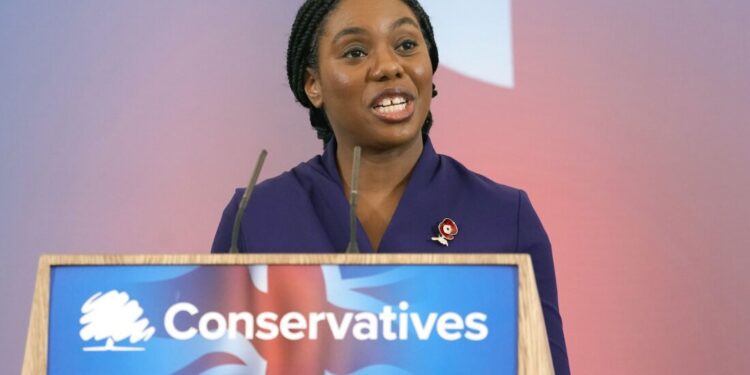Kemi Badenoch has been elected as the new leader of the Conservative Party, marking a new era for a party that has been reeling since a major election defeat. Badenoch, 44, is not only the first Black woman to lead the Conservative Party but is also expected to drive the party further to the right, emphasizing conservative values of personal responsibility, freedom, and a strong stance against what she deems as “woke” politics.
As Britain’s political landscape shifts, Badenoch’s election represents a significant transformation for the Tories, with potential implications that will shape the future of British politics. Here’s what you need to know about Kemi Badenoch, her vision for the Conservative Party, and the challenges she faces.
Who is Kemi Badenoch?
Kemi Badenoch was born in London to Nigerian immigrant parents. Her mother, a physiology professor, and her father, a doctor, moved the family to Lagos, Nigeria, where Badenoch spent her formative years. Growing up, she witnessed the political and economic instability that forced her family into hardship. At 16, she returned to Britain, navigating a challenging journey of self-reliance. Her experience of working at a McDonald’s while studying computer engineering has become part of her narrative of resilience and self-determination.
Rising quickly within Conservative ranks, Badenoch became known as an outspoken politician, willing to confront sensitive issues such as immigration, cultural identity, and Britain’s colonial past. Since entering Parliament in 2017, her rise has been swift, serving under prominent leaders like Boris Johnson, Liz Truss, and Rishi Sunak in various ministerial roles.
A Rightward Shift for the Conservatives?
As the new leader of the opposition, Badenoch’s conservative vision is expected to steer the party further right. Describing herself as a “thinking man’s Thatcherite,” Badenoch has voiced strong opinions on reducing immigration and re-establishing conservative values. She is known for opposing what she describes as “identity politics” and stands against policies that she believes compromise traditional British values.
In her acceptance speech, Badenoch emphasized the need to rebuild the Conservative Party on “authentic conservative foundations” and advocated for principles like individual responsibility and limited government intervention. Her stance has already caused a stir among the left, with critics questioning if her policies might set back efforts toward racial justice and equality. However, supporters view her as a symbol of “migrant patriotism,” representing immigrants who appreciate Britain’s values and freedoms and want to preserve them.
What Does This Mean for Immigration Policy?
Badenoch’s views on immigration have shifted over the years. Initially supportive of visa relaxations for skilled immigrants, she now believes that “numbers matter but culture matters more,” placing a premium on cultural compatibility and shared values over numerical immigration targets. This reflects her belief in safeguarding British culture and limiting immigration to prevent strain on public services and social cohesion.
With immigration being one of the most debated topics in British politics, her stance is expected to resonate with traditional conservative voters, though it may risk alienating more moderate members of her party.
Gender and Diversity in Politics
Badenoch’s election is a watershed moment not only because she is a Black woman leading a major British political party, but also because she is a leader unafraid to diverge from typical progressive stances on race and diversity. She often criticizes identity politics and has cautioned against policies she sees as divisive. Badenoch’s leadership may inspire a new dialogue on race and representation in British politics, focusing on meritocracy over identity-based policies.
Challenges Ahead for the Conservative Party
While her rapid ascent is impressive, Badenoch faces significant challenges as she steps into the role of opposition leader. The Labour Party, under Prime Minister Keir Starmer, currently holds a substantial majority in Parliament, which poses an uphill battle for Badenoch as she seeks to revive Tory fortunes.
Additionally, as the party transitions to opposition, maintaining party unity and appealing to a broad voter base will be essential. Her uncompromising stance on cultural issues and her unapologetic conservatism may appeal to the party’s core supporters but could risk alienating younger, more progressive voters who are increasingly influential in British politics.
The Path Forward
As Badenoch takes the reins of Britain’s oldest political party, her unique background and determined personality signal a new era of leadership that could redefine the Conservative Party’s role in British politics. By focusing on core conservative values, she aims to reinvigorate a party that has faced dwindling public support after more than a decade in power.
Her emphasis on individualism, national pride, and conservative policies aligns with a global trend where right-wing populism and cultural conservatism are increasingly shaping political landscapes. Badenoch’s journey from a challenging start in Nigeria to one of Britain’s most powerful political positions may resonate with voters seeking a fresh direction for the country.
With four years until the next general election, Badenoch’s leadership will be closely watched, both in Britain and abroad, as she seeks to prove that the Conservative Party can once again be a compelling force for the nation.
Related news:
Canada Appoints First Woman as Chief of Defense Staff
Shabana Mahmood Became UK’s First Female Muslim Lord Chancellor
















